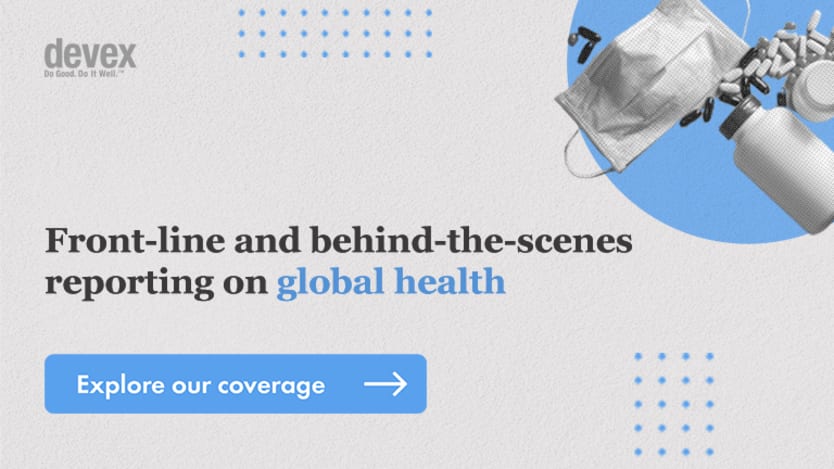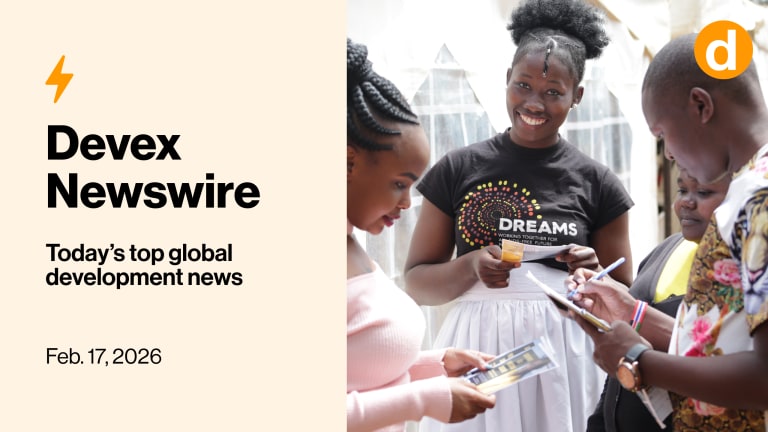Tackling logistical odds stacked against COVID-19 vaccination in Africa

Sign up for Devex CheckUp
The must-read weekly newsletter for exclusive global health news and insider insights.
When the COVID-19 vaccination exercise commenced for Nigeria’s front-line health workers, Banke Ibidunni, a health extension worker, was working at the Lalupon health center — an out-of-town duty post in a remote area about 85 kilometers (53 miles) away from the nearest vaccination center. Online registration was required before vaccination, but she had no internet access and failed to register.
When she eventually got a day off to venture into town, she realized it was too late as the window period for registration had lapsed for the administration of the first batch of the COVID-19 vaccines from AstraZeneca the country received in March.
“Even though the vaccine was available, they said the remaining doses were for those that had received their first shots,” she told Devex. “I had to go back to work unprotected — not because I didn’t want to and not because the vaccine wasn’t available. But because the registration period had closed.”
“My immediate superiors understood the lack of internet access at my duty post but the people that made the policy in Abuja probably did not remember to put that into consideration when they made that a mandatory requirement for the vaccination.”
— Banke Ibidunni, health extension worker, Lalupon health centerAt the onset of COVID-19 vaccination in Africa, the World Health Organization urged African countries to focus on administering first shots to as many citizens as possible instead of reserving half of the shipments they got for second doses. But the Nigerian government was among the few that decided to prioritize ensuring full vaccination, creating registration loopholes that left people like Ibidunni — who eventually received her shot four months later — waiting for the next round.
Health experts said logistical bottlenecks like the ones faced by Ibidunni need to be tackled alongside vaccine hesitancy and access for the continent to close its wide vaccination gap.
Logistical challenges
In many African countries, hospitals and health centers are predominantly being used to roll out the vaccines. Since the exercise began, health workers that had been providing health services in the facilities prior to COVID-19 have also had to integrate the vaccination exercise into their routine services — increasing their work burden, along with the number of individuals that visit the facilities.
At the Alegongo Health Center in the Akobo area of Ibadan, southwest Nigeria, the three nursing officers on duty had to divide tasks among themselves. The head nurse was put in charge of COVID-19 vaccination, a senior nursing officer was in charge of the pregnant women seeking antenatal care, while the third nurse was in charge of the distribution of insecticide treated nets.
When their attention was diverted to an emergency they had to suspend their assigned activities. This was met with murmurs among the prospective COVID-19 vaccine recipients who had been in the vaccination queue since early morning.
“They only trained some of us to give the vaccines and got us someone that does the registration verification of vaccine recipients, they did not give us more chairs, reduce our work load nor expand our facility to safely provide the service,” one of the nursing staff said. Adding that sending more people to the facility puts staff and patients at risk as they are unable to ensure that there is social distancing.
COVID-19 vaccine unpredictability complicates country-level planning
Donated doses of COVID-19 vaccines are arriving erratically in many African nations, sometimes with little warning on when they might arrive or what type of doses they might receive. This is making it a challenge for countries to plan their rollouts.
Additionally, in countries like South Africa, registering for vaccination is only possible for those with valid identity documents — a South African ID, international passport, or a refugee ID. Individuals are required to enter the details from their identification documents online and to present them at the vaccination site. However, data curated by the World Bank shows that the unregistered population in South Africa is made up of over 15.3 million people — representing nearly 30% of the country’s population.
A similar policy is also in place in Ghana where individuals are required to present valid photo IDs, potentially excluding about 15% of the population — nearly 5 million people — from the vaccination exercise.
A number of African countries, including Nigeria, have also introduced largely similar electronic vaccination data system portals to ensure that the data of vaccine recipients in their respective countries is adequately captured. But only 28% of the population in Sub-Saharan Africa are connected to the internet.
“My immediate superiors understood the lack of internet access at my duty post but the people that made the policy in Abuja probably did not remember to put that into consideration when they made that a mandatory requirement for the vaccination,” Ibidunni said.
‘A continuous learning process’
Though WHO officials that spoke to Devex agreed that there were logistical challenges in some countries they emphasized that this has led to some countries adopting new strategies.
“It is true that there have been some challenges. But what I think has happened is that the first round of vaccines — early vaccination rounds — and the after-action reviews has led to an evolvement of strategies,” said Dr. Matshidiso Moeti, WHO regional director for Africa.
“Many countries have started to diversify how people get registered and have done much more of an outreach approach to where they expect people to be connected — in communities, we've seen countries contact people through their churches, through their associations,” Moeti said.
One such country is the West African nation of Senegal. Dr. Aly Ngon Tambdou, the deputy chief medical officer of the Dakar health region, noted that the country has field vaccination officials working in mobile sites to bring COVID-19 vaccines closer to the people.
“Our goal is to vaccinate as many people as possible, and our strategy about vaccination is we try to organize the vaccination campaigns as close to the population as possible,” Tambdou said.
“We have mobile sites apart from the fixed sites in the capital and urban centers. For the mobile sites, we choose places where people normally congregate and this is where vaccination is available.”
Moeti said WHO has worked with African countries to review strategies and has advised countries on how to adapt, with emphasis on diversification.
“This is a continuous learning process and the idea is to accelerate as much as possible to get more people registered, and those who do, ensuring they get vaccinated with minimal effort and challenges,” she said.

Search for articles
Most Read
- 1
- 2
- 3
- 4
- 5








